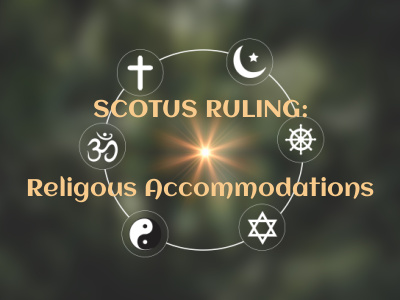Title VII of the Civil Rights Act of 1964 (Title VII) requires employers to accommodate employees’ sincerely held religious beliefs unless accommodation would result in an undue hardship. Historically, denial of a religious accommodation has carried a minimal burden of showing hardship, but a recent ruling from the U.S. Supreme Court just made denying a religious accommodation because of undue hardship more difficult.
The Facts
The issue of religious accommodation became significant during the COVID-19 pandemic, when employees who objected to vaccination because of their religious beliefs brought a slew of litigation across the country.
While this issue has faded away as vaccine mandates have dissipated, the religious accommodation test once again became front and center on June 29, 2023, when the Supreme Court issued a unanimous decision addressing, clarifying, and heightening the undue hardship test for religious accommodations in Groff v. DeJoy, Postmaster General.
In this case, Groff, an Evangelical Christian postal worker who believes Sunday should be devoted to worship and rest, was assigned Sunday work when his branch began doing Sunday deliveries. He refused to work on Sunday, and the U.S. Postal Service (USPS) disciplined him for refusing to work on Sunday.
The USPS claimed it was an undue hardship to accommodate Groff’s religious beliefs because his delivery duties would need to be redistributed to other staff. He eventually resigned and then sued under Title VII, alleging USPS could have accommodated his Sunday practice without undue hardship to business.
The district court ruled in favor of USPS, and the Court of Appeals agreed, stating that requiring an employer to bear more than a de minimis cost to provide a religious accommodation is an undue hardship. Application of the de minimis standard test was consistent with long-established precedent.
The Supreme Court, however, unanimously vacated the lower court’s opinion and redefined the undue burden standard, holding that when a religious accommodation is requested and an employer claims an undue hardship, the employer must grant an accommodation unless doing so would result in substantial increased costs in relation to its business.
Bottom Line
Post-Groff, you must analyze each religious accommodation request carefully to ensure any denial is based on evidence that the accommodation would result in substantial increased costs.
It’s also important to review and revise policies and procedures for making religious accommodation requests to ensure compliance with the new test and to educate managers on such policies and procedures.
Mackenzie Clark is an attorney with Bodman PLC in Troy. She can be reached at 248-925-1926 or mclark@bodmanlaw.com.

